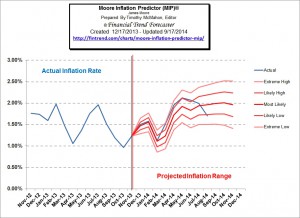People are often confused about the difference between DEFLATION and DISINFLATION. Deflation is when prices are actually falling compared to last year, i.e., you will actually pay less for enough items to reduce your cost of living. It doesn't necessarily mean that everything costs less but enough items cost less to make the inflation rate negative. Disinflation on the other hand, simply means that the rate of inflation is slowing. This could be for as little as one month, i.e., annual inflation was 4% in May 2023 and then it was 3% in June 2023. That is a big disinflation. But it was 3.2% in July 2023. So there was no monthly disinflation but there was still disinflation over two months … [Read more...]
Inflation Falls 3rd Straight Month
The Bureau of Labor Statistics (BLS) released the August inflation numbers today and for the third straight month inflation is lower. The annual inflation rate for the 12 months ending in May was 2.13%. The June inflation numbers were 2.07%. In July inflation fell to 1.99% and in August it was down to 1.70%. As the inflation rate falls this is "disinflation" on an annual basis although July and August were "deflationary" on a monthly basis, i.e. each monthly number was below zero at -0.04% and -0.17% respectively. Our Moore Inflation Predictor (MIP) is generally quite accurate. Last month the MIP forecast a slight decrease in inflation for August but we actually got a bit larger 14.5% … [Read more...]
Which is Better: High or Low Inflation?
It would seem intuitively obvious that low inflation is good for consumers, because costs are not rising faster than their paychecks. The problem with high inflation is that even with "cost of living" increases there is a time lag between when the cost of goods increases and when you get your raise. But recently commentators have been saying that "Low inflation introduces uncertainty". This is nonsense. During the high inflation "Eighties" I remember commentators saying "High Inflation introduces uncertainty". This is not quite true either. The truth is that steady inflation, whatever its level, if it can be relied upon to remain steady, does not introduce uncertainty. Changing … [Read more...]
Disinflation – What is it?
Definition of Disinflation By Tim McMahon To fully understand disinflation we need to first understand inflation. The reasons this is trickier than it first appears is because the word inflation is actually used in two different contexts. The most common usage of the word inflation means rising prices. Commonly "consumer prices" so when you go to the gas station or the grocery store and the things you buy cost more than last month (or when it is really bad even more than last week) this is more precisely defined as "price inflation". The second meaning of the word inflation is actually the original meaning. And that is an increase in the money supply that causes "price … [Read more...]




